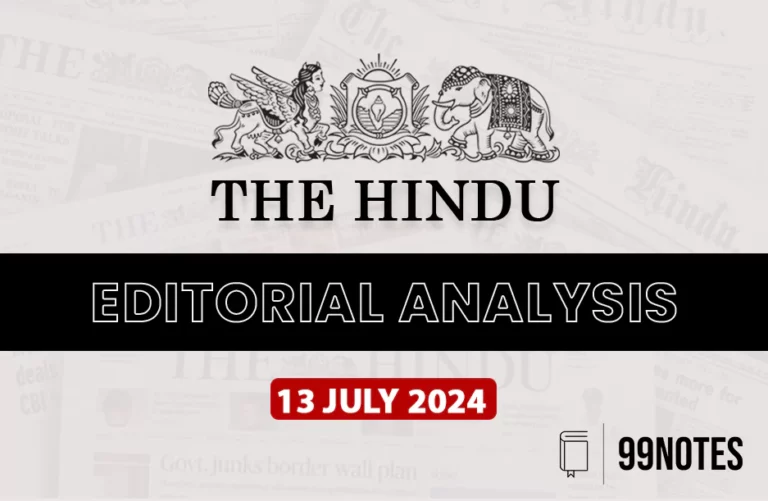15 November 2024 : The Hindu Editorial Analysis
1. Leverage similarity, complementarity in Nigeria
(Source – The Hindu, International Edition – Page No. – 8)
| Context |
|
Historical Ties and Cultural Resonance
- India and Nigeria share a unique historical connection dating back to around 1500 AD with Baba Ghor, a Nigerian gem merchant who settled in Gujarat.
- This deep-rooted cultural link symbolises the longstanding ties between the two nations, underlining the potential for a renewed strategic partnership.
Overview of Modi’s Visit
- Prime Minister Narendra Modi will visit Nigeria on November 16-17, 2024, marking his first visit to the nation.
- Nigeria is Africa’s most populous country and second-largest economy, sharing cultural and strategic ties with India.
- Indian presence in Nigeria is significant, with companies like Airtel, Cipla, Tata, and Bajaj active in the country.
- The two nations, both large, multi-ethnic democracies, share challenges in governance, socio-economic development, and countering terrorism and corruption.
Existing Economic and Strategic Relations
- India has a substantial presence in Nigeria, with 150 Indian companies investing $27 billion and 50,000 Indians living in Nigeria.
- Bilateral trade between India and Nigeria stands at $7.9 billion, with India as Nigeria’s second-largest trading partner.
- Despite India’s prominent position, bilateral trade has halved since its peak, and India lacks upstream assets in Nigeria’s oil sector.
Opportunities for a Bilateral Framework and Engagement
- Modi’s visit, after a 17-year gap, highlights the need for regular high-level engagements.
- The Indian diaspora in Nigeria, the second-largest employer, can serve as a vital link to enhance economic and cultural connections.
- A strategic platform for private sector cooperation could accelerate growth, with financial and policy support to encourage collaboration.
Nigeria’s Economic Reforms Under President Tinubu
- Since his 2023 election, President Bola Tinubu has implemented major reforms, including removing petroleum subsidies, deregulating the Naira, and dismissing key officials.
- These measures, while causing temporary economic strain, are aimed at long-term stabilisation and growth for Nigeria.
- India can support these efforts, particularly in sectors where Nigeria faces challenges like currency stability and economic diversification.
Potential Areas of Collaboration
- Defence and Security: Nigeria faces terrorism threats, piracy, and regional instability. India, with similar experiences, could assist Nigeria with defence supplies, training, and technological support.
- Economic Stabilisation: India could aid Nigeria’s foreign exchange issues by fostering joint ventures in hydrocarbons and infrastructure and offering lines of credit and trade in rupees.
- Trade Diversification: To counter declining exports to Nigeria, India can increase its supply of petroleum, foodstuffs, pharmaceuticals, and consumer goods.
- Education and Services: India’s expertise in IT, healthcare, and vocational training offers areas of mutual benefit, with services exports supporting Nigerian development needs.
| Practice Question: Discuss the strategic importance of Nigeria for India in the context of Modi’s upcoming visit and the potential areas of collaboration in defence, trade, and socio-economic development. (150 Words /10 marks) |
2. A 2024 election result that leaves many astounded
(Source – The Hindu, International Edition – Page No. – 8)
| Context |
|
Challenges Facing Indian Democracy
- Systemic Obstacles to Fair Functioning:
- Despite being the world’s largest democracy, India faces complex systemic issues that challenge its democratic institutions.
- Social inequalities, economic disparities, and regional divides often complicate governance and weaken the public’s trust in democratic systems.
- Polarisation and Identity Politics:
- Growing polarisation along caste, religion, and regional lines impacts the spirit of democracy.
- This focus on divisions can create an environment conducive to authoritarian tendencies.
Democratic Backsliding in Global Context
- Global Rise of Authoritarianism:
- In recent years, several democracies worldwide have experienced a drift toward authoritarianism.
- Nations like Hungary and Turkey, once praised for their democratic structures, have witnessed a tightening of control by leaders, who exploit existing institutions to centralise power and undermine checks and balances.
- Lessons for India:
- The experience of these nations serves as a cautionary tale for India.
- Independent courts and a free press uphold democracy, but leaders often undermine them for personal power.
- Democratic safeguards like judiciary and press freedom weaken when leaders use populism to consolidate unchecked authority.
Socioeconomic Inequality and Democratic Vulnerabilities
- Socioeconomic Disparities:
- Economic inequality in India poses a significant risk to democratic health.
- The growing divide between urban and rural populations weakens democratic representation and fuels political resentment.
- Socioeconomic inequalities often lead to resentment, which political leaders exploit to gain support and power.
- Impact on Voter Demographics:
- A large segment of the population, particularly the rural and economically marginalised, is susceptible to populist promises.
- Leaders who prioritise identity-based appeals over developmental policies can exploit these divisions to consolidate power, as seen globally.
Erosion of Democratic Institutions
- Weakening of Institutional Independence:
- Over time, democratic institutions in India, such as the judiciary, the Election Commission, and investigative agencies, have faced accusations of politicisation.
- This politicisation can dilute the neutrality of these bodies, making it difficult to ensure fair governance and eroding public trust in democracy.
- Media Control and Information Manipulation:
- An independent press is essential to a functioning democracy, yet concerns over media ownership, government influence, and censorship are increasing.
- The concentration of media ownership and pressure on journalists restricts critical coverage, allowing leaders to control narratives and shape public opinion.
Authoritarian Tendencies in Indian Governance
- Centralization of Power:
- The increasing centralization of authority within the executive branch has led to concerns over the weakening of federalism.
- While centralised decision-making can provide quick responses in crisis situations, unchecked central authority risks undermining state autonomy and creating a lopsided power structure.
- Restrictive Policies on Civil Liberties:
- The use of restrictive laws and regulations, such as those related to national security or sedition, raises concerns about stifling dissent.
- Democracies thrive on open debate and criticism, yet limitations on civil liberties in the name of order and security may limit the scope for healthy public discourse.
- Populism and Identity Politics:
- Populist narratives that exploit religious and caste-based identities have gained traction, often sidelining critical issues.
- While such promises can secure electoral wins, they undermine the democratic ideal of governance that serves all citizens equally.
The Need for Strengthening Democratic Principles
- Reinforcing Institutional Independence:
- Safeguarding the autonomy of democratic institutions is crucial to ensuring accountability and transparency.
- Strengthening the judiciary, Election Commission, and other key institutions can reinforce public trust and help prevent power consolidation.
- Media Freedom and Transparency:
- Ensuring freedom of the press and supporting independent journalism are essential for maintaining transparency and accountability.
- A robust and unbiased media enables informed citizenry, critical discourse, and checks on power.
Lessons from Global Democratic Decline
- Importance of Vigilance Against Authoritarian Drift:
- The experiences of other democracies demonstrate the gradual nature of authoritarian shifts.
- By remaining vigilant and fostering a culture of accountability, India can mitigate the risks of democratic backsliding.
- Encouraging Social Cohesion:
- In a country as diverse as India, promoting social cohesion and unity across different communities is critical to a healthy democracy.
- Policies that prioritise inclusivity over identity politics help reduce divisions that can be exploited by authoritarian forces.
Conclusion
- Democracy is India’s strength, rooted in its Constitution and values of freedom, equality, and secularism.
- Upholding these principles amidst challenges requires a commitment from both leaders and citizens to protect democratic ideals.
| Practice Question: Discuss the factors contributing to the rise of authoritarian tendencies in modern democracies. Analyse the impact of these tendencies on India’s democratic institutions and suggest measures to strengthen democratic resilience in the country. (250 Words /15 marks) |


